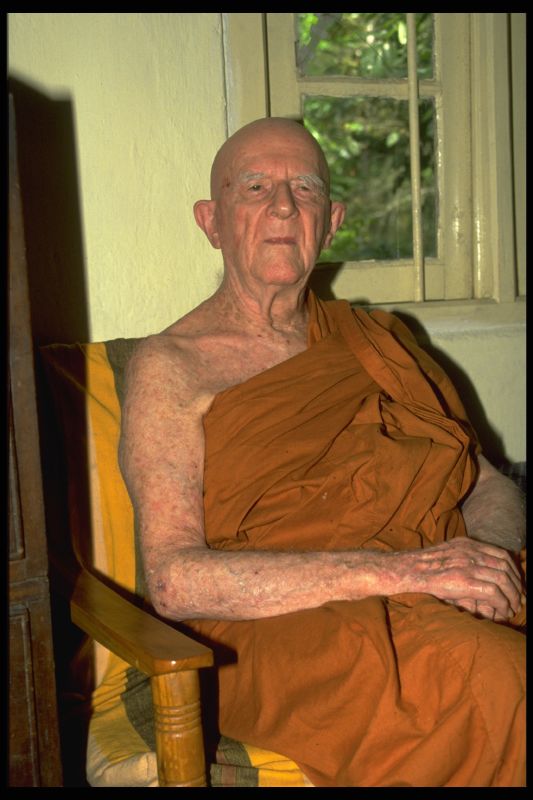“Buddhism and the God-Idea” (1962)
Contexte: The lives and writings of the mystics of all great religions bear witness to religious experiences of great intensity, in which considerable changes are effected in the quality of consciousness. Profound absorption in prayer or meditation can bring about a deepening and widening, a brightening and intensifying, of consciousness, accompanied by a transporting feeling of rapture and bliss. The contrast between these states and normal conscious awareness is so great that the mystic believes his experiences to be manifestations of the divine; and given the contrast, this assumption is quite understandable. Mystical experiences are also characterized by a marked reduction or temporary exclusion of the multiplicity of sense-perceptions and restless thoughts. This relative unification of mind is then interpreted as a union or communion with the One God....
The psychological facts underlying those religious experiences are accepted by the Buddhist and are well-known to him; but he carefully distinguishes the experiences themselves from the theological interpretations imposed upon them. After rising from deep meditative absorption (jhāna), the Buddhist meditator is advised to view the physical and mental factors constituting his experience in the light of the three characteristics of all conditioned existence: impermanence, liability to suffering, and absence of an abiding ego or eternal substance. This is done primarily in order to utilize the meditative purity and strength of consciousness for the highest purpose: liberating insight. But this procedure also has a very important side effect which concerns us here: the meditator will not be overwhelmed by any uncontrolled emotions and thoughts evoked by his singular experience, and will thus be able to avoid interpretations of that experience not warranted by the facts.
Hence a Buddhist meditator, while benefiting from the refinement of consciousness he has achieved, will be able to see these meditative experiences for what they are; and he will further know that they are without any abiding substance that could be attributed to a deity manifesting itself to his mind. Therefore, the Buddhist’s conclusion must be that the highest mystical states do not provide evidence for the existence of a personal God or an impersonal godhead.
Nyanaponika Thera: Citations en anglais
“True wisdom is always young, and always near to the grasp of an open mind.”
The Heart of Buddhist Meditation (1965)
Contexte: Some doubt may arise in the minds of Western men how they could be helped in their present problems by a doctrine of the far and foreign East. And others, even in the East, may ask how words spoken 2,500 years ago can have relevance to our ‘modern world’, except in a very general sense. Those who raise the objection of distance in space (meaning by it, properly, the difference of race), should ask themselves whether Benares is truly more foreign to a citizen of London than Nazareth from where a teaching has issued that to that very citizen has become a familiar and important part of his life and thought. They should further he willing to admit that mathematical laws, found out long ago in distant Greece, are of no less validity today, in Britain or elsewhere. But particularly these objectors should consider the numerous basic facts of life that are common to all humanity. It is about them that the Buddha preeminently speaks. Those who raise the objection of the distance in time, will certainly recall many golden words of long-dead sages and poets which strike such a deep and kindred chord in our own hearts that we very vividly feel a living and intimate contact with those great ones who have left this world long ago. Such experience contrasts with the "very much present" silly chatter of society, newspapers or radio, which, when compared with those ancient voices of wisdom and beauty, will appear to emanate from the mental level of stone-age man tricked out in modern trappings. True wisdom is always young, and always near to the grasp of an open mind.
pp. 20-21
Source: The Heart of Buddhist Meditation (1965), p. 21
Contexte: It is a significant fact and worth pondering upon that the Bible commences with the words: “In the beginning God created the heaven and the earth....", while the Dhammapada … opens with the words "Mind precedes things, dominates them, creates them". These momentous words are the quiet and uncontending, but unshakeable reply of the Buddha to that biblical belief. Here the roads of these two religions part: the one leads far away into an imaginary Beyond, the other leads straight home, into man's very heart.
Source: The Heart of Buddhist Meditation (1965), p. 34
“Buddhism and the God-Idea” (1962)
Source: The Heart of Buddhist Meditation (1965), p. 32
Source: The Heart of Buddhist Meditation (1965), pp. 78-79
Source: The Vision of Dhamma (1994), p. 34
Source: The Vision of Dhamma (1994), p. 79
Source: The Vision of Dhamma (1994), pp. 30-31
Source: The Heart of Buddhist Meditation (1965), p. 34
Source: The Heart of Buddhist Meditation (1965), p. 31
Source: The Vision of Dhamma (1994), p. 75
Source: The Vision of Dhamma (1994), p. 80
Source: The Vision of Dhamma (1994), p. 77
Source: The Heart of Buddhist Meditation (1965), pp. 34-35
Source: The Heart of Buddhist Meditation (1965), p. 30
Source: The Heart of Buddhist Meditation (1965), p. 24
Source: The Vision of Dhamma (1994), p. 71
Source: The Heart of Buddhist Meditation (1965), p. 39
Source: The Heart of Buddhist Meditation (1965), p. 38
Source: The Heart of Buddhist Meditation (1965), p. 38
“Buddhism and the God-Idea” (1962)
Source: The Heart of Buddhist Meditation (1965), p. 35
Source: The Vision of Dhamma (1994), "Courageous Faith", p. 304
The Vision of Dhamma (1994), "Devotion in Buddhism"
